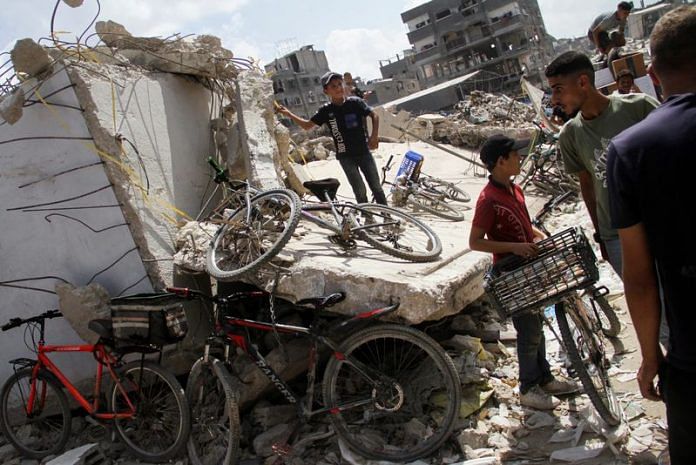By Nidal al-Mughrabi and James Mackenzie
CAIRO/JERUSALEM (Reuters) -Gaza ceasefire and hostage negotiators discussed new compromise proposals in Cairo on Saturday, seeking to bridge gaps between Israel and Hamas, but there was no indication of progress after hours of talks.
“The talks in Cairo didn’t make any progress. Israel is insisting to keep eight positions along the Philadelphi corridor,” one Palestinian official close to the mediation effort told Reuters, asking not to be named due to the sensitivity of the subject.
The Cairo talks came as the humanitarian situation in Gaza deteriorated, with malnutrition soaring and polio discovered in the Palestinian enclave.
Israeli military strikes in Gaza killed 50 people on Saturday, Palestinian health authorities said, with victims trapped under rubble or lying on roads where fighting continued.
A Hamas delegation had arrived in Cairo on Saturday to be nearer at hand to review any proposals that emerged in the main talks between Israel and mediators Egypt, Qatar and the United States, two Egyptian security sources said.
A U.S. official said negotiators from the United States met with Egypt, then with Egypt and Qatar on Saturday, and believed that representatives from Egypt and Qatar were meeting with Hamas.
The Hamas delegation returned to Doha, Qatar, after the briefing on the round of talks ended, the Palestinian official said.
Months of on-off talks have failed to produce a breakthrough to end Israel’s devastating military campaign in Gaza or free the remaining hostages seized by Hamas in the militant group’s Oct. 7 attack that triggered the war.
The Egyptian sources said the new proposals include compromises on outstanding points such as how to secure key areas and the return of people to north Gaza.
However there was no sign of any breakthrough on key sticking points, including Israel’s insistence that it must retain control of the so-called Philadelphi Corridor, on the border between Gaza and Egypt.
Hamas has accused Israel of going back on things it had previously agreed to in the talks, which Israel denies. The group says the United States is not mediating in good faith.
In Israel, Prime Minister Benjamin Netanyahu has locked horns with Israeli ceasefire negotiators over whether Israeli troops must remain all along the border between Gaza and Egypt, a person with knowledge of the talks said.
DISEASE SPREADING
Continuing the war will worsen the plight of Gaza’s 2.3 million people, nearly all of them homeless in tents or shelters among the ruins, with malnutrition rampant and disease spreading, and risk the lives of the remaining Israeli hostages.
The Oct. 7 attack killed 1,200 people, according to Israeli tallies. Israel’s Gaza campaign has killed more than 40,000 people, Palestinian health authorities say.
U.N. humanitarian agency OCHA said in a Friday update that the amount of food aid entering Gaza in July was one of the lowest since October, when Israel imposed a full siege.
OCHA said that in July the number of children with acute malnutrition in northern Gaza was four times higher than in May, while in the more accessible south, where fighting is less severe, the number more than doubled.
The World Health Organisation said on Friday that a 10-month-old baby had been paralysed with polio, the first such case in the territory in 25 years, raising fears of a wider outbreak given the lack of proper sanitation for people living in ruins.
More warfare also risks major new escalations, with Iran still weighing retaliation for the assassination of Hamas leader Ismail Haniyeh on its territory last month.
Meanwhile, U.S. Air Force General C.Q. Brown, chairman of the Joint Chiefs of Staff, began an unannounced visit to the Middle East on Saturday to discuss ways to avoid any new escalation in tensions that could spiral into a broader conflict, as the region braces for a threatened Iranian attack against Israel.
Fighting between Israel and Iranian-backed Hezbollah since Oct. 7 has ramped up recently, including with Israeli strikes across southern Lebanon and into the Bekaa, and with more Hezbollah rocket fire into northern Israel.
(Reporting by Nidal al-Mughrabi, Enas Alashray and Adam Makary in Cairo, Emily Rose, James Mackenzie in Jerusalem, Phil Stewart in Amman and Steve Holland in Washington; Writing by Angus McDowall and Patricia Zengerle; Editing by Giles Elgood, Mark Porter and Rod Nickel)
Disclaimer: This report is auto generated from the Reuters news service. ThePrint holds no responsibilty for its content.



